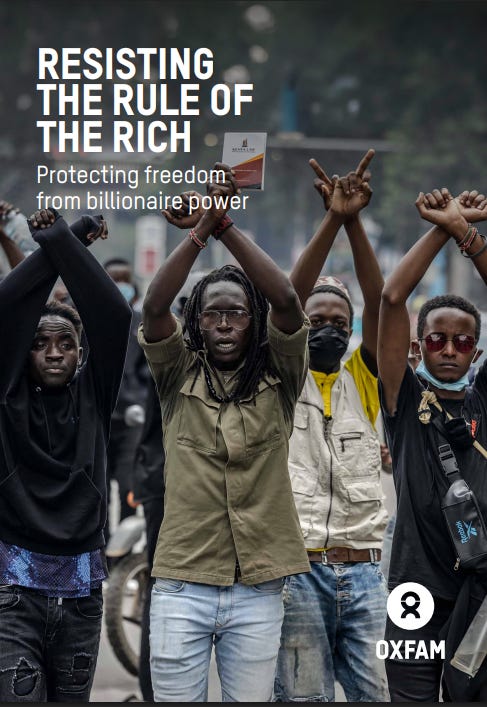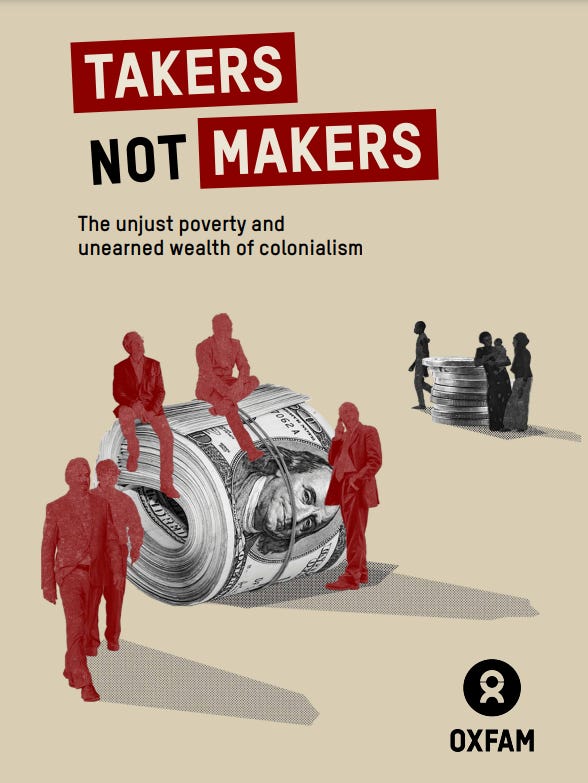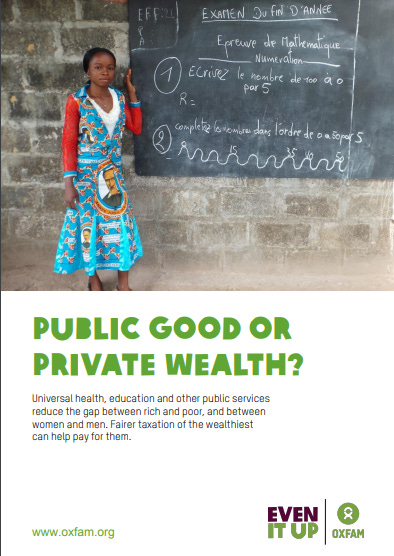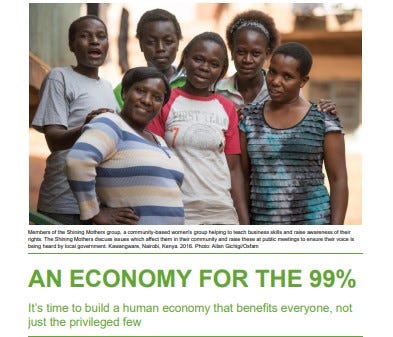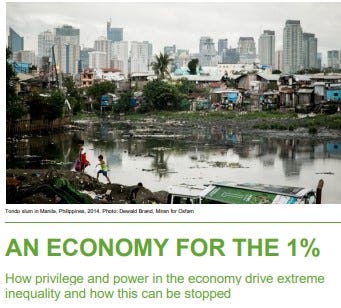Davos hub
“The only useful thing that happens at Davos each year is the release of Oxfam’s report on economic inequality, a document that always drives home exactly why Davos is a monstrosity.” Hamilton Nolan
Here’s every inequality report Oxfam has released to coincide with Davos.
2026- Resisting the Rule of the Rich: Defending Freedom Against Billionaire Power
Billionaire fortunes have grown at a rate three times faster than the previous five years since the election of Donald Trump in November 2024. While US billionaires have seen the sharpest growth in their fortunes, billionaires in the rest of the world have also seen double-digit increases.
Few people would disagree that when a billionaire uses their wealth to buy a politician, to influence a government, to own a newspaper or a social media platform, or to out-lawyer any opposition to ensure they are above the law, that these actions undermine progress and fairness. Such power gives billionaires control over all our futures, undermining political freedom and the rights of the rest of us.
2025 - Takers not Makers: The unjust poverty and unearned wealth from colonialism
Billionaire wealth has risen three times faster in 2024 than 2023. Five trillionaires are now expected within a decade. Meanwhile, crises of economy, climate and conflict mean the number of people living in poverty has barely changed since 1990. Most billionaire wealth is taken, not earned - 60% comes from either inheritance, cronyism and corruption or monopoly power. Our deeply unequal world has a long history of colonial domination which has largely benefited the richest people. The poorest, racialized people, women and marginalized groups have and continue to be systematically exploited at huge human cost.
2024 - Inequality Inc.: How corporate power divides our world and the need for a new era of public action
Since 2020, the richest five men in the world have doubled their fortunes. During the same period, almost five billion people globally have become poorer. Hardship and hunger are a daily reality for many people worldwide. At current rates, it will take 230 years to end poverty, but we could have our first trillionaire in 10 years… A more equal world is possible if governments effectively regulate and reimagine the private sector.
2023 - Survival of the Richest: How we must tax the super-rich now to fight inequality
This report focuses on how taxing the rich is vital to addressing this unprecedented polycrisis and skyrocketing inequality and lays out how much tax the richest should pay, and the practical, tried and tested ways in which governments can raise such taxation. It shows us how taxing the rich can set us clearly on a path to a more equal, sustainable world free from poverty.
2022 - Inequality Kills: The unparalleled action needed to combat unprecedented inequality in the wake of COVID-19
Inequality contributes to the death of at least one person every four seconds. But we can radically redesign our economies to be centered on equality. We can claw back extreme wealth through progressive taxation; invest in powerful, proven inequality-busting public measures; and boldly shift power in the economy and society.
The Davos in January 2022 was virtual due to the pandemic but met IRL in May, so we did a short media briefing paper.
Profiting from pain: The urgency of taxing the rich amid a surge in billionaire wealth and a global cost-of-living crisis
2021 - The Inequality Virus: Bringing together a world torn apart by coronavirus through a fair, just and sustainable economy
The coronavirus pandemic led to an increase in inequality in almost every country at once, the first time this has happened since records began… The crisis exposed our collective frailty and the inability of our deeply unequal economy to work for all. Yet it also shown us the vital importance of government action to protect our health and livelihoods. Transformative policies that seemed unthinkable before the crisis suddenly shown to be possible. There can be no return to where we were before. Instead, citizens and governments must act on the urgency to create a more equal and sustainable world.
2020 - Time to care: Unpaid and underpaid care work and the global inequality crisis
In 2019, only 2,153 people had more wealth than 4.6 billion people. This great divide is based on a flawed and sexist economic system that values the wealth of the privileged few, mostly men, more than the billions of hours of the most essential work – the unpaid and underpaid care work done primarily by women and girls around the world.
2019 - Public good or private wealth?
The number of billionaires has doubled since the financial crisis and their fortunes grow by $2.5bn a day, yet the super-rich and corporations are paying lower rates of tax than they have in decades.
Universal health, education and other public services reduce the gap between rich and poor, and between women and men. Fairer taxation of the wealthiest can help pay for them.
2018 - Reward work, not wealth: To end the inequality crisis, we must build an economy for ordinary working people, not the rich and powerful.
In 2017, 82% of all wealth created went to the top 1%, and nothing went to the bottom 50%. Dangerous, poorly paid work for the many is supporting extreme wealth for the few. Women are in the worst work, and almost all the super-rich are men. Governments must create a more equal society by prioritizing ordinary workers and small-scale food producers instead of the rich and powerful.
2017 - An economy for the 99%: It’s time to build a human economy that benefits everyone, not just the privileged few
Estimates show that just eight men own the same wealth as the poorest half of the world. As growth benefits the richest, the rest of society – especially the poorest – suffers. The very design of our economies and the principles of our economics have taken us to this extreme, unsustainable and unjust point. Our economy must stop excessively rewarding those at the top and start working for all people. Accountable and visionary governments, businesses that work in the interests of workers and producers, a valued environment, women’s rights and a strong system of fair taxation, are central to this more human economy.
2016 - An Economy For the 1%: How privilege and power in the economy drive extreme inequality and how this can be stopped
The global inequality crisis is reaching new extremes. The richest 1% now have more wealth than the rest of the world combined. Power and privilege is being used to skew the economic system to increase the gap between the richest and the rest. A global network of tax havens further enables the richest individuals to hide $7.6 trillion. The fight against poverty will not be won until the inequality crisis is tackled.
2015 - Wealth: Having It All and Wanting More
Global wealth is increasingly being concentrated in the hands of a small wealthy elite. These wealthy individuals have generated and sustained their vast riches through their interests and activities in a few important economic sectors, including finance and pharmaceuticals/healthcare. Companies from these sectors spend millions of dollars every year on lobbying to create a policy environment that protects and enhances their interests further. The most prolific lobbying activities in the US are on budget and tax issues; public resources that should be directed to benefit the whole population, rather than reflect the interests of powerful lobbyists.
2014 - Working for the Few: Political capture and economic inequality
Economic inequality is rapidly increasing in the majority of countries. The wealth of the world is divided in two: almost half going to the richest one percent; the other half to the remaining 99 percent. The World Economic Forum has identified this as a major risk to human progress. Extreme economic inequality and political capture are too often interdependent. Left unchecked, political institutions become undermined and governments overwhelmingly serve the interests of economic elites to the detriment of ordinary people. Extreme inequality is not inevitable, and it can and must be reversed quickly.
2013 - The Cost of Inequality: How wealth and income extremes hurt us all
An explosion in extreme wealth and income is exacerbating inequality and hindering the world’s ability to tackle poverty. The $240 billion net income in 2012 of the richest 100 billionaires would be enough to end extreme poverty four times over, according to this Oxfam media briefing. It calls on world leaders to curb today’s income extremes and commit to reducing inequality to at least 1990 levels.


